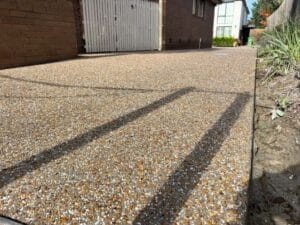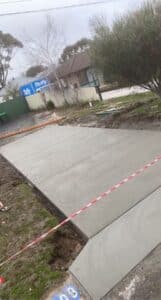A concrete driveway can last up to 30 years or more. Its lifespan will typically depend on several factors, such as the quality of the initial construction, maintenance, and climate conditions.
However, extreme weather conditions such as excessive heat and moisture can lead to cracking of the concrete surface. Such damage will lead to the shortening of its lifespan. The same can be said if it experiences heavy traffic regularly.
In this post, we’ll discuss more about the longevity of concrete driveways.
What is the Average Lifespan of a Concrete Driveway?
The average lifespan of a concrete driveway is around 20 to 30 years. This varies based on factors such as the ones mentioned above.
4 Ways To Extend the Lifespan of Your Driveway
- Regular cleaning: Clean your concrete driveway regularly to remove debris, dirt, and stains. Use a power washer or a stiff-bristled brush and mild detergent to clean the surface.
- Seal the driveway: Sealing your concrete driveway every few years can help protect it from the elements, including UV rays, water, and chemicals. A sealer will also help to prevent cracking and chipping.
- Avoid heavy loads: Avoid parking heavy trucks or machinery on the driveway, as it can cause damage to the surface. Read our blog to know if a concrete driveway need rebar for added durability.
- Repair cracks: If you notice any cracks in your concrete driveway, repair them as soon as possible. Small cracks can quickly turn into larger ones, which can be more difficult and expensive to repair.
Following these tips can help extend the life of a concrete driveway while keeping it looking great for years to come.

When Should I Replace a Concrete Driveway?
You should replace a concrete driveway once you start to notice the following:
Signs of Damage
The first sign that a concrete driveway may need to be replaced is visible damage. Cracks, holes, and unevenness in the surface can all indicate that the driveway is no longer structurally sound. Additionally, if water is pooling on the surface of the driveway, it could be a sign of underlying damage.
Installed a Long Time Ago
Another factor to consider when deciding to replace a concrete driveway is age. In Australia, where extreme weather conditions can take a toll on driveways, the average lifespan of a concrete driveway is around 20-30 years. If your driveway is approaching this age or is older, it may be time to consider a replacement.

Poorly Maintained
Regular maintenance is essential to the longevity of a concrete driveway. However, if your driveway has been neglected or poorly maintained, it may be beyond repair. Suppose you’ve noticed significant damage and have neglected maintenance over the years. In that case, it may be time to consider a total replacement.
No Longer Safe and Functional
The cost of replacing a concrete driveway can vary widely depending on the driveway’s size, the damage’s extent, and other factors. In general, a replacement can be a significant investment. Still, it may be necessary to ensure the safety and functionality of your driveway.
So, is it a good idea to get a concrete driveway? Read our blog to find out.
